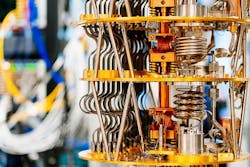Quantum computing has the potential to create new machines that can vastly exceed the capabilities of today’s most powerful supercomputers. The ongoing development of quantum computers will create a new class of data processing facility, which in many cases will be very different from the enterprise and cloud data centers seen today.
Although researchers are still some years from unlocking the full promise of quantum computing, it’s never too early to explore what the technology might mean for computing facilities. Google recently offered a look inside its Quantum AI Lab, an early prototype what quantum data centers might look like. The facility in Santa Barbara, Calif. is where Google hopes to create the first error-corrected quantum computer, a key milestone in applying the technology.
The facility reflects one approach to quantum computing, but illustrates how these buildings will be very different from the current generation of cloud and HPC (high-performance computing) data centers.
An example: A simple quantum computer is about the size of a room, featuring a cryostat that maintains the quantum processor at a super-cold temperature of about 10 milliKelvin – making the cryostat one of the coldest places in the known universe.
From Bits to Qubits
A quantum computer harnesses quantum mechanics to deliver huge leaps forward in processing power. Instead of the binary bits used by digital computers, quantum computers use qubits – subatomic particles such as electrons or photons – which can be harnessed to generate far more processing power than an equivalent number of binary bits.
“With a classical computer you start with building blocks that are called bits,” explains Erik Lucero, Research Scientist at Google. “These bits can be like a switch, either zero or one. In a quantum computer, the fundamental building blocks are quantum bits. These are also known as qubits, and qubits can actually be in a superposition of states. That is, they can be both zero and one at the same time.
“This allows for a very rich computational space now that you have this superposition of states to actually do the computation,” said Lucero. “It opens up a whole new world of new computational capabilities.”
Google hopes to create a system in which 1 million physical qubits can work in concert inside a room-sized error-corrected quantum computer. That’s a big leap from today’s modestly-sized systems of fewer than 100 qubits. Google is currently working on building the world’s first “quantum transistor” — two error-corrected “logical qubits” performing quantum operations together — and then figure out how to tile hundreds to thousands of them to form the error-corrected quantum computer, a process the company says will take years.
“We’ve really designed this to be the kind of place where we can land a number of these milestones along the way,” said Lucero. “Each one of these cryostats are systems that our team has spent many, many hours in design and customizations to make these some of the most powerful quantum computers in the world. We can do the impossible. and we look at quantum computing as something that may be a 10-year investment, but at the other end of that will be this tool for humanity. That gives us the ability to invent the future.”
Here’s a video tour of the Quantum AI Lab, in which Lucero provides a walk-through of Google’s Sycamore processor and the cryostat environment, as well as a future roadmap for quantum computing.
The facility design is a significant departure from the massive cloud data centers that Google operates, which feature rows and rows of racks filled with servers and storage. For a closer look, see Inside A Google Data Center: 2020 Version.
For data center professionals who are used to room-level cooling or aisle containment, one of the biggest changes is the use of cryostats in quantum computing facilities to create extremely cold environments for processing. Lucero explained how the cooling system creates these temperatures.
“These refrigerators, which are also called dilution refrigerators or cryostats, use a technology similar to the refrigerators that you have at home – with a few exceptions,” said Lucero. “First, we evacuate the entire system, so it’s under vacuum. And then we have two stages of cooling. The idea is similar to just running antifreeze through your refrigerator at home, but instead of running antifreeze, we run a dilution of helium, where we use helium 3 and Helium 4, with Helium 4 being the more abundant isotope of helium that’s around. With those techniques, we can compress that helium and do cooling much like you would do at your refrigerator at home. But we get much, much colder.”
Quantum Aspirants Use Different Approaches
Google is just one of the organizations seeking to develop a quantum computer. Other leading players with quantum labs include IBM, Honeywell, Intel, Microsoft, and Amazon Web Services. There’s also a group of startups focused on quantum computing, including two which in recent weeks have unveiled plans to become publicly traded. Last month IonQ went public when it was acquired by a SPAC (special purpose acquisition corporation), and Rigetti Computing has announced a similar buyout by a public SPAC.
These companies use a number of different strategies in their approach to quantum computing. This has implications for facility design, as explained by Dr. Celia Merzbacher, the Executive Director of the Quantum Economic Development Consortium (QED-C), which aims to enable and grow the U.S. quantum industry.
In a keynote at Data Center World last summer, Merzbacher noted that Honeywell and IonQ use an approach known as trapped ion quantum computing, which does not require the cryostats or super-cold environments used by Google and IBM.
“We may be using a Honeywell quantum computer that operates at room temperature,” said Merzbacher. “The way that they cool those trapped ions is with lasers, so it is very localized laser cooling. We still really don’t know exactly which quantum computer is likely the most widely used. (For data center managers), it’s not something to worry about now, it’s more something to watch.”
For the foreseeable future, there will be a small number of quantum computing facilities, due to the cost and complexity of the technology.
“For now, quantum computers are going to be accessed via the cloud, partly because of this issue of the sensitivity to the environment,” said Merzbacher. “The companies that are making these want to control that environment very carefully, as it’s sort of fragile and also dynamic. But you can access the cloud examples of quantum computers today, and that’s likely to be the case for some time.”
About the Author


